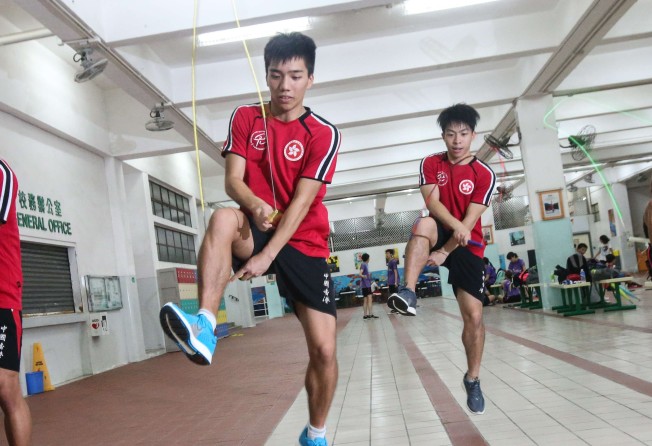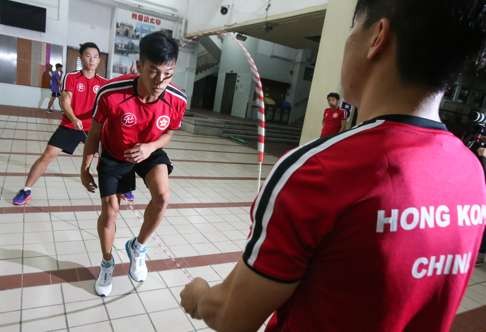Rope skipping Hong Kong youngsters win gold at world championships, and hope to win recognition for sport
With little institutional support, team members had to fork out HK$20,000 to travel to Sweden for the competition, as well as HK$700 of training fees every month

While most eyes are on athletes at the Olympics, another group of skilled sportsmen has already won gold for Hong Kong. Timothy Ho Chu-ting, 21, led the Hong Kong Rope Skipping Team to top honours at the biennial World Rope Skipping Championships in Sweden earlier this month, bagging gold in the men’s individual and team categories.
His teammate Tommy Chow Wing-lok, meanwhile, broke a decade-long dominance by Australia to clinch victory in the freestyle competition, becoming an internet sensation after a clip of his performance attracted nearly 900,000 views in 10 days.
Their success stories have captivated the city, but the popularity doesn’t always translate into recognition by sports bodies, and their coach hopes the public can pay more attention to the sport as a whole, rather than just their gold-medal journeys.
According to coach Ken Cheng Kam-yuen, a lack of recognition from the government is the cause of his sport’s failure to gain traction. The Sports Federation and Olympic Committee’s refusal to endorse rope skipping as a member sport also means that no priority access is granted to facilities and sponsorships.
As a result, each of the 137 team members had to fork out HK$20,000 to travel to Sweden for the competition, as well as HK$700 of training fees every month.
But the group isn’t discouraged by their lack of mainstream status. On a hot and humid night at Workers’ Children Secondary School in Ho Man Tin, Hong Kong Team 01 – the best five rope skippers of the group – plows through a series of routines in the three-hour training session, each focused on a different technique.
What they share in common though were sweat-drenched smiles, with no complaints about the hired venue’s stuffy conditions. “We are happy as long as we can get together and start skipping,” Ho says.
Introduced to the sport at the age of eight, Ho became Hong Kong champion four years later and has just taken part in his fifth world championships. But it was more than just about the medals and silverware. “I learned how to persevere, and I made so many friends during the process.”
Asked what his biggest setback was, the student says it was a wrist injury he sustained during a somersault four years ago which sidelined him for one month. “I was really close to quitting the sport, but my teammates and my coach brought me back.”
Teammate Chow says of his freestyle victory: “I never thought I would go this far.” It took him about a year to string together the incredible moves, which lasted only 75 seconds.
Years of training have taken a toll on their knees and wrists, but they say they have gotten back so much more than they have given to the sport.

The team’s youngest member, 18-year-old Parco Shum Po-hang, for example, has secured a conditional offer at Polytechnic University – which recognised the sport – through the Outstanding Sportsmen Recommendation Scheme.
“I am not a very hardworking person, but skipping is my source of motivation and has rewarded me with so much in life,” Shum admits.
Despite snatching 27 golds, 26 silvers and 26 bronzes out of 813 contestants across 20 countries at this year’s world championships, coach Cheng warns there is no time for complacency, as this “golden era” will not last forever. He has made a bold move – splitting the five best members into different teams so they can nurture new talent.
“Our mission is to pass on the torch,” Cheng said. “We cannot win medals every time. What matters to me is that my students are enjoying the process and share a sense of belonging.”